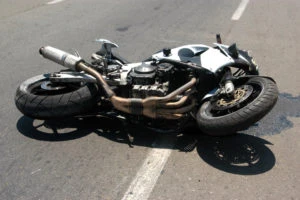
Who is at fault in a Florida motorcycle accident depends on who acted negligently. Negligence is defined as any action or inaction that puts others at risk of harm. Examples include speeding, tailgating, weaving in and out of lanes, and disobeying traffic signals.
All motorists, whether they operate motorcyclists or cars, must refrain from acting negligently. If their actions cause a collision, they can be liable for any resulting injuries.
Who Could Be Responsible for My Motorcycle Accident in Florida?
Depending on your situation, one or more of the following parties could share fault for your motorcycle accident:
- A motorist. All motorists have a civil obligation to drive with reasonable caution. This involves looking out for motorcyclists and following traffic laws.
- A government agency. The government must maintain safe roadways for Floridians. This involves filling potholes, removing roadside debris, and fixing non-functional traffic lights.
- A product manufacturer. If your vehicle malfunctioned, its manufacturer could be responsible. Examples of defective components include stuck accelerators, faulty brakes, and leaks.
- An employer. If you suffered harm after getting hit by a commercial truck, you can seek damages from the trucker’s employer. This is possible under a principle known as “vicarious liability.” This lets you seek compensation from an employer if their employee causes you harm.
Other parties could be at fault for your motorcycle accident. We will determine who’s responsible.
To consult with an experienced motorcycle accident lawyer today
855-780-9986
What Causes Motorcycle Accidents in Florida?
Per the U.S. General Services Administration (GSA), human error causes 98 percent of all traffic accidents. While defective vehicles, unsafe roadways, and other contributors cause accidents, the leading causes of collisions include:
- Intoxicated driving
- Distracted driving, such as texting
- Speeding
- Tailgating
- Lane-splitting
- Racing
- Reckless driving
- Disobeying stop signs and other traffic signals
- Road rage
Florida Operates on a Pure Comparative Fault System
Many people know that Florida’s a no-fault state. However, it’s more complicated than that. That’s because Florida also follows a pure comparative fault system, as explained by Florida Statutes § 768.81.
This basically means:
- Being partially at fault does not prevent you from seeking damages
- Multiple parties can share fault for a collision
- Your percentage of fault may affect your final settlement or court award
Consider this hypothetical scenario to understand fault. As a motorcyclist, you suffer harm in a collision. After reviewing your situation, it’s determined you are 20 percent at fault, and the driver is 80 percent at fault. Here, you can recover 80 percent of your damages. So, if your losses totaled $100,000, you could recover $80,000.
Why Does Florida Require Personal Injury Protection (PIP) Coverage?
Here’s the thing: even though Florida follows a pure comparative fault rule, it’s still a no-fault state. So, you generally start pursuing compensation by filing a claim with your own insurance provider–regardless of who caused the crash.
At this point, you can request compensation up to the maximum allowable limits. Minimum PIP coverage accounts for your healthcare expenses and a portion of your lost wages.
Florida Statutes § 316.027 notes that you can pursue compensation from the other party’s insurer if your injuries pass a certain threshold. For instance, if you broke your arm, you can file a claim with the other party’s insurer.
We understand that this can get complicated. Navigating the legal process is just one reason why injured claimants partner with lawyers.
Evidence Determines Fault in Motorcycle Accidents
Without supporting evidence, demonstrating fault quickly turns into a “he said, she said,” battle. When a lawyer takes your case, they will launch an investigation into your accident and injuries. They may secure and use the following to support your case:
- The police report
- Dashcam, traffic camera, or security camera footage
- Photos of the accident scene
- Your imaging scans, lab test results, and medical records
- Witness testimony
- Black box data
Click to contact our Florida Attorneys today
We Can Use Evidence to Prove Negligence
We must prove negligence to recover compensation for your losses. Proving negligence requires us to show:
- Another party (like a motorist) had an obligation to keep others safe–also known as a “duty of care” — all road users have this obligation
- The other party breached their duty of care by violating traffic laws or driving recklessly
- They caused your motorcycle accident
- You suffered harm and incurred financial losses
Proving these elements on your own isn’t easy. Matters can get more complicated if you’re suffering from serious injuries or grieving a loved one. That’s where our law firm comes in. We’re ready to handle everything your case needs from beginning to end.
You Have Options After a Motorcycle Accident in Florida
After suffering a motorcycle accident, you can pursue compensation via an insurance claim or lawsuit. Our lawyers will calculate your losses, file your claim, and pursue the funds you need.
Bogin, Munns & Munns has decades of experience helping accident claimants in Florida. Today, you can start a free case review and learn about your options. We’re ready to take your call and answer your questions. To get started, dial (855) 686-6752.
Call or Submit Our Consultation Request Form Today



